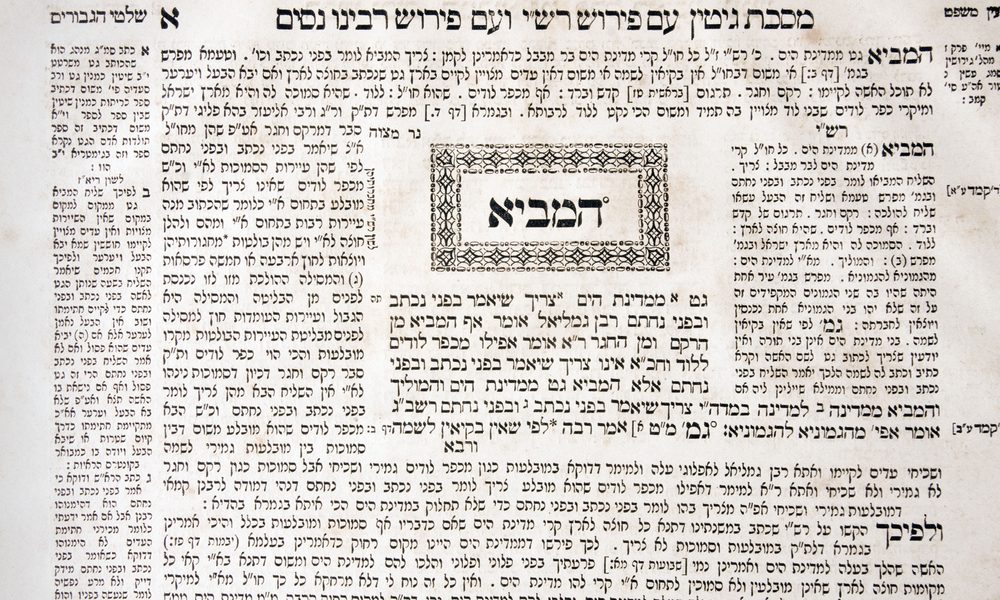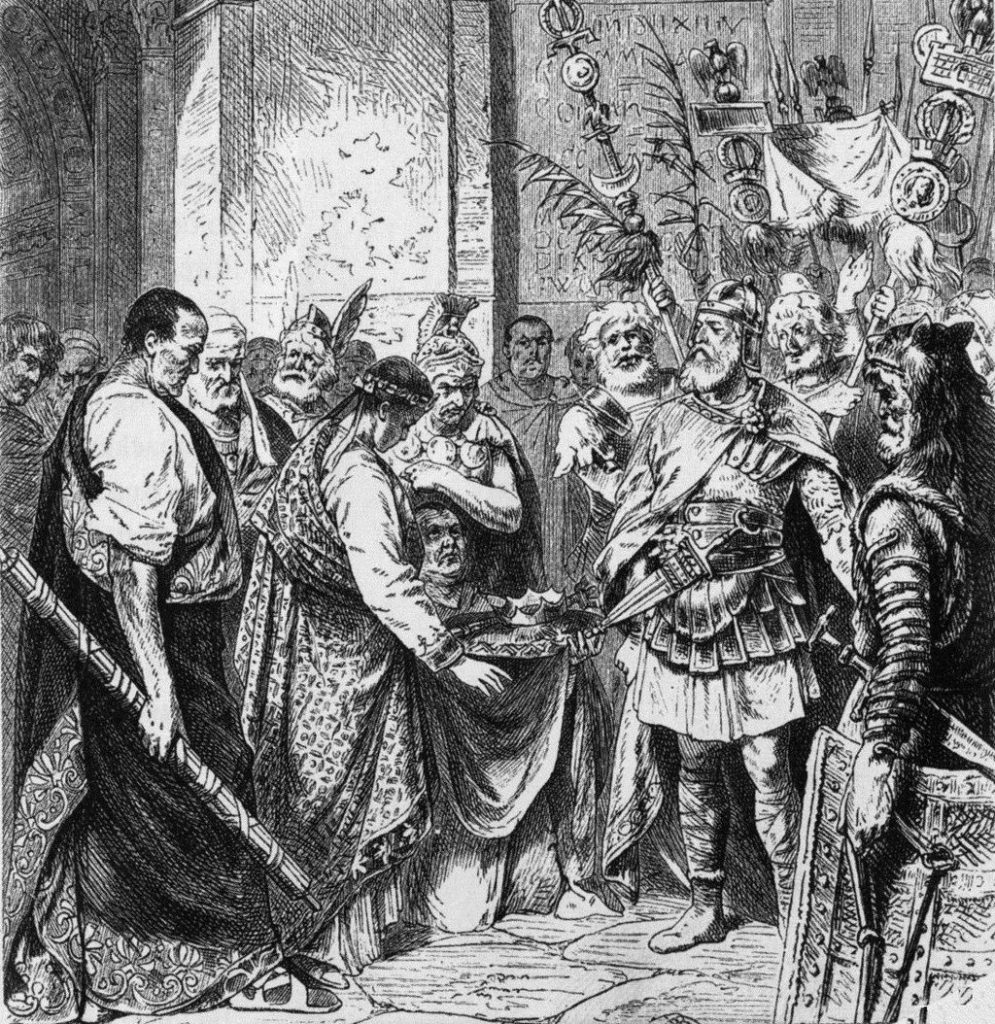
470 AD to 490 AD, Psalm 71: Talmud of Babylon.
This site was first built in French (see www.147thgeneration.net). The English translation was mainly done using « google translation ». We have tried to correct the result of this translation to avoid interpretation errors. However, it is likely that there are unsatisfactory translations, do not hesitate to communicate them to us for correction.
(for that click on this paragraph)
Summary
This generation is from the years 470 AD to 490 AD.
According to our count, this generation is the 71st generation associated with Psalm 71. It is in this Psalm 71 that we therefore find an illustration of the facts of this generation.
The last emperor Romulus Augustule is deposed by the powerful German leader Odoacer in September 476. This date is often remembered as the end of the Western empire.
If the fate of the Jews in the whole world of this generation does not improve, a certain lull is to be noted. This is used to finalize the Babylon Talmud. Its writing, which began at the beginning of the fourth century, is completed by Rabbina (474-499).
The importance of the compilation of Babylonian Talmud for the preservation of Judaism through the ages is paramount. If the Bible is the foundation of Judaism, the Talmud is the central pillar. Spiritually and intellectually, he is the keystone of Jewish life.
Talk
Twilight of the Western Roman Empire
In this generation, the twilight of the Western Roman Empire is confirmed.
The last emperor Romulus Augustule is deposed by the powerful German leader Odoacer in September 476. This date is often remembered as the end of the Western empire.
In Byzantium, Leo I died in 474.
It is Zénon his son-in-law, who succeeds him after his own son officially appointed by Léon gives him power. Zeno makes peace with the Vandals. He continues to reign throughout this generation, having to thwart many attempts of overthrow mainly by his relatives.
At the level of the Persian kingdom, Perôz died in 484 in a new battle against the Hephtalites where the Sassanid army was defeated. Balash succeeded him for four years (484-488) before Qobad succeeded him at his death, both being sons of Perôz.
Compilation of Babylonian Talmud
If the fate of the Jews in the whole world of this generation does not improve, a certain lull is to be noted. This is used to finalize the Babylon Talmud. Its writing, which began at the beginning of the fourth century, is completed by Rabbina (474-499).
The importance of the compilation of Babylonian Talmud for the preservation of Judaism through the ages is paramount:
- If [1] the Bible is the foundation of Judaism, the Talmud is the central pillar. Spiritually and intellectually, he is the keystone of Jewish life.
- Or again: « These are things the fruits of which a man enjoys in this world, while the principal remains for him in the World to Come: Honoring one’s father and mother, acts of kindness, and bringing peace between a man and his fellow. But the study of Torah is equal to them all. « (Mishna Peah 1,1).
It is this bulwark for the Jewish world that constitutes the Babylonian Talmud that David evokes in the beginning of the psalm of this generation:

- In You, O Lord, have I taken refuge; let me never be ashamed.
- The Talmud represents a refuge for the Jewish people.
- With Your charity, You shall save me and rescue me; extend Your ear to me and save me.
- Be for me a sheltering rock in which to enter continually; You commanded [others] to save me because You are my rock and my fortress.
- By studying the Torah through the Talmud, the people confirm their full adherence to the divine covenant and trust.
- My God, rescue me from the hands of the wicked, from the palm of him who treats unjustly and robs.
- For You are my hope, O Lord God, my trust since my youth.
- I relied on You from birth; from my mother’s womb You drew me; my praise is always in You.
- It is the gift of the Torah that gave birth to the Jewish people who are grateful from generation to generation.
- I was an example for the multitude, but You were my strong shelter.
- My mouth will be filled with Your praise, all the days with Your glory.
- Do not cast me away at the time of old age; when my strength fails, do not forsake me.
- For my enemies said of me, and those who watch for my soul took counsel together,
- Saying, « God has forsaken him; pursue and seize him, for there is no rescuer. »
- O God, do not distance Yourself from me; my God, hasten to my assistance.
- The adversaries of my soul will be shamed and will perish; enwrapped in humiliation and disgrace will be those who seek to harm me.
- This generation also marks the end of the last connections with the land of Israel, where Jews are increasingly in the minority and Christians have appropriated all the high places. The past glory of the people of Israel gradually fades to give way to total exile. Israel has lost its vigor and as an old man wanders helplessly among nations. David prays to God not to leave him in such a propitious moment for his enemies.
- As for me, I shall constantly hope, and I shall add to all Your praise.
- My mouth will recite Your righteousness, all the days Your salvation, for I do not know their number.
- I shall come with the mighty deeds of the Lord God; I shall mention Your righteousness alone.
- O God, You have taught me since my youth, and until now I shall recite your wonders.
- And even until old age and hoary hairs, O God, do not forsake me, until I tell [of] Your strength to the generation, to everyone who comes-Your might
- And Your charity, O God, [which is] up to the heights, for You do great things. O God, who is like You?
- Sure of divine support for the rest of the night, David renews his materialized trust in this generation by the Talmud that will allow all future generations to proclaim divine glory despite the apparent misfortunes affecting the Jewish people.
- That You showed me great and evil troubles, You will revive me again, and from the depths of the earth You will again raise me up.
- You will increase my greatness, and You will turn and comfort me.
- I too shall thank You with a stringed instrument for Your truth, my God; I shall play music to You with a harp, O Holy One of Israel.
- My lips will sing praises when I play music to You, and my soul, which You redeemed.
- Also my tongue will utter Your righteousness all the days, for those who seek my harm are shamed, yea, for they are disgraced.
- David concludes by renewing his belief in the final resurrection that will then allow the Jewish people to express their gratitude to God with new celebrations worthy of the ancient Temple of Solomon destroyed.

[1] The Talmud – (French) Steinsaltz edition – Guide and lexicons / Chapter: Introduction (French: Le Talmud – édition Steinsaltz – Guide et lexiques/Chapitre : Introduction (p1 et 2) ).

